2017--2018学年人教版选修八Unit 5 Meeting your ancestors learning about language课时作业
- 格式:docx
- 大小:134.05 KB
- 文档页数:9
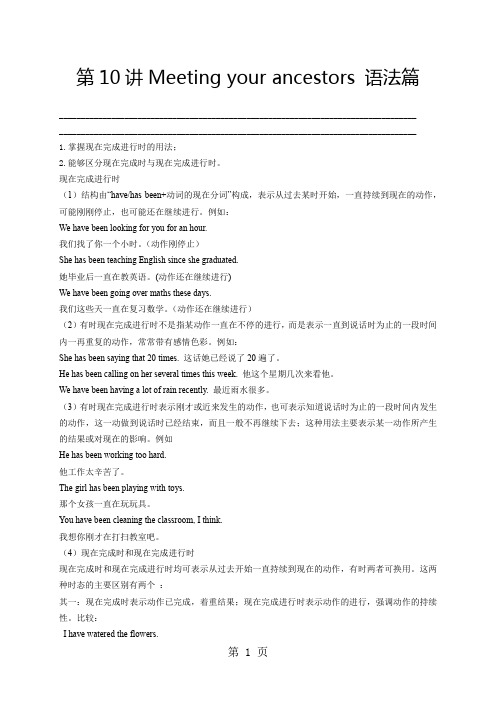
第10讲Meeting your ancestors 语法篇____________________________________________________________________________________________________________________________________________________________________1.掌握现在完成进行时的用法;2.能够区分现在完成时与现在完成进行时。
现在完成进行时(1)结构由“have/has been+动词的现在分词”构成,表示从过去某时开始,一直持续到现在的动作,可能刚刚停止,也可能还在继续进行。
例如:We have been looking for you for an hour.我们找了你一个小时。
(动作刚停止)She has been teaching English since she graduated.她毕业后一直在教英语。
(动作还在继续进行)We have been going over maths these days.我们这些天一直在复习数学。
(动作还在继续进行)(2)有时现在完成进行时不是指某动作一直在不停的进行,而是表示一直到说话时为止的一段时间内一再重复的动作,常常带有感情色彩。
例如:She has been saying that 20 times. 这话她已经说了20遍了。
He has been calling on her several times this week. 他这个星期几次来看他。
We have been having a lot of rain recently. 最近雨水很多。
(3)有时现在完成进行时表示刚才或近来发生的动作,也可表示知道说话时为止的一段时间内发生的动作,这一动做到说话时已经结束,而且一般不再继续下去;这种用法主要表示某一动作所产生的结果或对现在的影响。
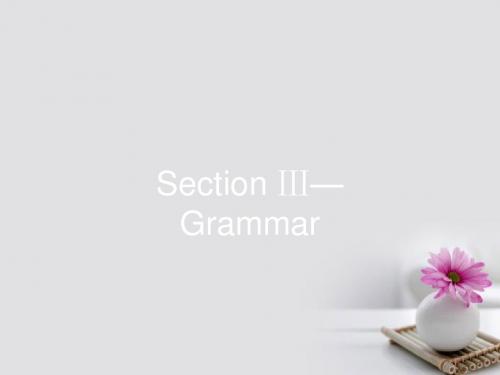

2018学年度人教版选修8Unit5Meeting yourancestorsPeriod3Learning about language教案设计(Revise the verb tenses <including the Present Perfect ContinuousTenses>)IntroductionIn this period students will be first helped by the teacher to discover and learn to use some useful words and expressions, and then to revise the verb tenses <including the Present Perfect Continuous Tenses>. The following steps of teaching may be taken: warming up by revising the verb tenses <including the Present Perfect Continuous Tenses>, reading aloud to the recording, discovering useful words and expressions, reading more about Davidson Black, revising the present perfect continuous tense, discovering useful structures and closing down by looking and saying. ObjectivesTo help students revise the verb tenses <including the Present Perfect Continuous Tenses>To help students discover and learn to use some useful words and expressionsTo help students discover and learn to use some useful structures Procedures1. Warming up by revising the verb tenses <including the Present Perfect Continuous Tenses>Active TensesTHE PASSIVE TENSES2. Reading aloud to the recordingThe more you read aloud, the better you get at it; the better you get at it, the more you like it; and the more you like it, the more you do it.And the more you read aloud, the more you know; and the more you know, the smarter you grow.So listen and read to the recording of the text. Pay attention to the pronunciation, stress and intonation.3. Discovering useful words and expressionsTurn to page 40 and fill in the blank to complete the two exercises.4. Reading more about Davidson BlackDavidson Black (1884-1934)Davidson Black was born in Toronto, Canada in 1884. He learned early on that good communication skills with other cultures would aide him in learning about them. Black not only befriended the Indians and learnedtheir languages in his early days; he also got along extremely well with his Chinese colleagues. He was always eager to know more and this progressed throughout his life.He earned a degree in Medical Science in 1906 from the University of Toronto, then went back to study comparative anatomy. By 1909, Black was an Anatomy Instructor. After realizing his passion for human evolution, he gained his big break. In 1919 he was offered a position at Peking Union Medical College in China. In 1927, Black began an enormous excavation at Zhoukoudian, which is near Peking. It was there that a hominid lower molar of unusual distinction was discovered. After studying this tooth with intense focus, Black recognized the existence of a previously unknown hominid genus and species. He also pointed out the close relationships among Peking man and Pithecanthropus Erectus.Davidson Black inferred that the Peking man was ‘a thinking being, standing erect, dating to the beginning of the Ice Age.’ Some s cientists were skeptical of Black’s findings, and in 1928, while Black was traveling to validate his beliefs to other scientists, half of a lower jaw was found with three teeth still intact. But the evidence he was really looking for was in the discovery of skull of the first Peking man.In 1932, Black was elected a Fellow of the Royal Society. His hard work and dedication carried him far in his experiments and discoveries, but the stress eventually got to him. He struggled with a congenital heartdefect, which when he overworked would act up. He worked long days at his office, often returning again to work during the night, with very minimal sleep. This obsession eventually lead to his death at age 49, in March of 1934, while working alone in his office at night.5. Revising the present perfect continuous tensePresent Perfect ContinuousFORM Present Perfect Continuous[HAS / HA VE] + [BEEN] + [VERB+ing]EXAMPLES:I have been sitting here for two hours.She has only been studying Japanese for two years.NOTE: When you are using a verb tense with more than one part such as Present Perfect Continuous (has been studying), adverbs often come between the first part and the second part (has only been studying).USE 1Duration from the Past Until NowWe use the Present Perfect Continuous to show that something started in the past and has continued up until now. "For five minutes", "for two weeks", and "since Tuesday" are all durations which can be used with the Present Perfect Continuous.EXAMPLES:They have been talking for the last hour.She has been working at that company for three years.James has been teaching at the University since June.USE 2 Recently, LatelyYou can use the Present Perfect Continuous WITHOUT a duration such as "for five minutes", "for two weeks", and "since Tuesday". Without the durations, the this tense gives a more general meaning of "lately". We often use the words "lately" or "recently" in the sentence to strengthen this meaning.EXAMPLES:Recently, I have been feeling really tired.She has been watching too much television lately.Mary has been feeling a little depressed.IMPORTANTRemember that the Present Perfect Continuous has the meaning of "lately" or "recently." If you use the Present Perfect Continuous in a question such as "Have you been feeling alright?", it suggests that the person looks sick or unhealthy. A question such as "Have you beensmoking?" suggests that you can smell the smoke on the person. Using this tense in a question suggests you can see, smell, hear, or feel the results of the action. It is possible to insult someone by using this tense incorrectly.IMPORTANT Non-Continuous Verbs/ Mixed VerbsIt is important to remember that Non-Continuous Verbs cannot be used in any continuous tenses. Also, certain non-continuous meanings for Mixed Verbs cannot be used in continuous tenses.To express the idea of Present PerfectContinuous with these exception verbs, youmust use Present Perfect.EXAMPLES:Sam has been having his car for two years. Not CorrectSam has had his car for two years. CorrectACTIVE / PASSIVE Present Perfect ContinuousEXAMPLES:Recently, John has been doing the work. ACTIVERecently, the work has been being done by John. PASSIVENOTE: Present Perfect Continuous is rarely used in its passive form.6. Discovering useful structuresNow turn to page 40 and do exercises 1, 2 and 3.7. Closing down by looking and sayingNow to end this period, let’s look at the photo and say something about our ancestors. How did they live in the old days? What did they do for a living?。

Unit 5 Meeting Your AncestorsWarming Up1 In pairs, try to identify these objects. Discuss what they were made of and explain their use. Who do you think used them? Can you think of the alternatives we would use today? 两两一组认这些物品。
讨论它们是用什么做的,解释它们的用途。
你认为是什么人用过它们?你能想一想我们如今用什么东西替换了它们?2 When you have come to a conclusion, fill in the chart below. Then report to the class.当你得出结论,填写下表,然后向班上同学报告。
do you think是插入语。
1 单词插入语:用作插入语的单词通常位于句中或句末,用逗号隔开。
①那的确是件憾事。
_________________________________________________________________________________②然而,他较幸运,因为他只受点轻伤。
_______________________________________________________________③(= Though he is young, he knows a lot about the world.)他很年轻,但他很懂人情世故。
________________________2 短语插入语:最常见的是介词短语,但还可以是非谓语动词短语和其他的一些短语。
用逗号隔开。
常见的有:after all, by any chance, by no means, in addition, of course, roughly speaking, to a certain extent, to be exact, to begin with等。
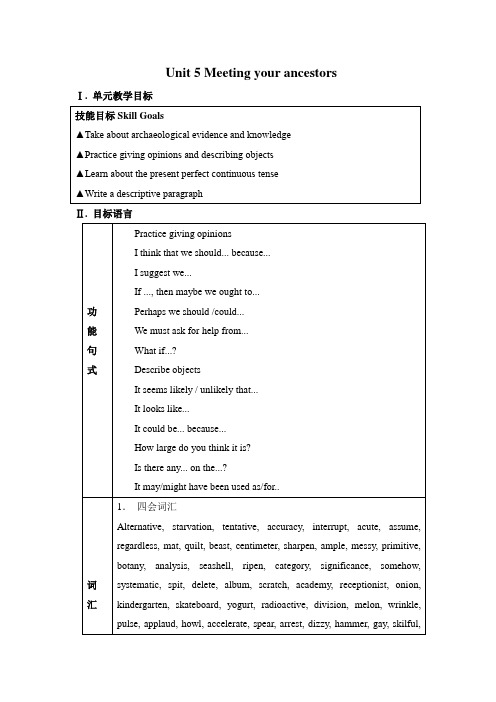
Unit 5 Meeting your ancestors Ⅰ. 单元教学目标Ⅱ. 目标语言Ⅲ. 教材分析和教材重组1. 教材分析本单元以General knowledge of archaeology and Anthropology as well as history 为话题,通过学习周口店洞穴北京人遗址、埃及古墓等古代文明,使学生了解一些考古学及人类发展变迁历史等方面的知识;激发学生热爱人类、热爱历史、热爱考古的兴趣,进而使学生懂得保护文化遗产的重要意义。
通过对一些古文物的识别、鉴定和描述,使学生学会鉴别、描述事物(考古现象)特征的方法。
1.1 Warming Up 给出了四幅图片,要求学生通过识别、描述古代中国、希腊、埃及的文物,使学生了解古代文明在人类社会发展史上的重大意义.1.2 Pre-reading 要求学生能从不同侧面比较、描述现代人和北京人的不同之处,为Reading 部分的学习做好准备。
1.3 Reading 是一位考古学家和来参观周口店北京人遗址的英格兰学生之间的一段对话。
要求学生通过阅读对话,了解周口店北京人在衣食住行、使用工具上的特点;了解古人类惊人的生活和创造能力。
1.4 Comprehending 共设计了三部分习题。
第一题是根据课文回答问题;第二题要求学生在理解课文的基础上,结合生活实际,写出北京人在居住、使用工具和衣着方面与现代人的三个不同之处;第三题训练学生的概括和写作能力。
要求学生通过分析归纳考古学家的介绍,写出关于周口店考古工作所经历的三个阶段的相关情况,并利用这些信息写一篇关于周口店洞穴的介绍。
1.5 Learning about Language分词汇和语法两部分。
其中Discovering useful words and expressions 中第一题要求学生运用所给词汇的适当形式填空;第二题要求所给短语完成句子。
通过这两个练习使学生掌握本单元的描述性语言。

![新人教版选修八_Unit_5_Meeting_your_ancestors-Language_points[课件]](https://img.taocdn.com/s1/m/480dab5f3c1ec5da50e27014.png)
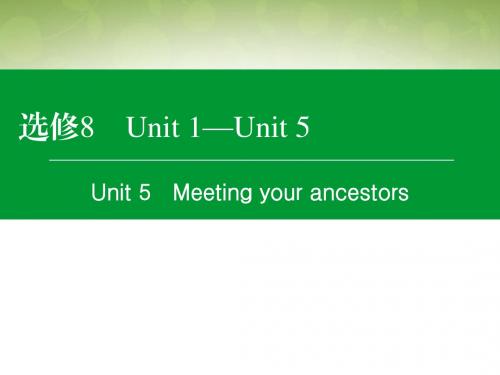

Unit 5Meeting your ancestorsPeriod 2Language Study整体设计教学内容分析The emphasis of this period will be placed on the important new words,phrases and sentence patterns in Warming Up,Pre-reading,Reading,Comprehending and Discovering useful words and expressions in Learning about Language.There are altogether 45 new words and phrases in these five parts.9 of them are marked with triangles,which shows that the students needn't learn them by heart.It is enough to recognize them when meeting them while reading the passage.The other 36 should all be remembered,among which the following words and expressions are even more important:tentative,sharpen,ample,primitive,alternative,interrupt,assume,regardless,regardless of,at most,significance,somehow.They are all very useful and important.So are the sentence patterns “You must be aware that it's here that we found evidence of some of the earliest people who lived in this part of the world.” “So we think it is reasonable to assume they lived in these caves,regardless of th e cold.” “We have been excavating layers of ash almost six metres thick,which suggests that they might have kept the fire burning all winter.”三维目标设计Knowledge and skills1.To get the students to learn to use the following important new words and phrases freely:tentative,sharpen,cut up,ample,primitive,alternative,interrupt,assume,regardless,regardless of,significance,somehow,at most2.To get the students to understand and use the following important and useful sentence patterns:(1)You must be aware that it's here that we found evidence of some of the earliest people who lived in this part of the world.(2)So we think it is reasonable to assume they lived in these caves,regardless of the cold.(3)We have been excavating layers of ash almost six meters thick,which suggests that they might have kept the fire burning all winter.Process and methods1.To help the students to understand the meanings of the above useful new words and expressions in the context,and then give some explanations about them,and at last offer some exercises to make students master their usages.2.To ask the students to make their own sentences by imitating the above sentence patterns.3.At the end of the class,make students do more exercises for consolidation.In doing so,they can learn,grasp and use these important language points well.Emotion,attitude and value1.To stimulate students' interest in learning English.2.To develop students' sense of cooperation and teamwork.教学重点、难点1.Important new words and expressions:alternative,interrupt,assume,regardless of,significance,somehow2.Important and useful sentence patterns:(1)be aware+objective clauses(2)the usage of the present perfect continuous tense(3)some difficult and long sentences in the text教学过程Step 1Revision1.Check the homework exercises.2.Ask some students to describe Peking Man's life.Step 2Reading and findingGet students to read through Warming Up,Pre-reading,Reading,Comprehending and Discovering useful words and expressions in Learning about Language to underline all the new words and useful expressions or collocations in these parts.Read them aloud and copy them down in the exercise book.Step 3Vocabulary studyⅠ.简单知识扫描(A级)1.tentative(P37)【原句再现】Make a tentative guess about what Peking Man may have done and used thousands of years ago.暂且猜猜几千年前“北京人”可能做的事情和用的东西。

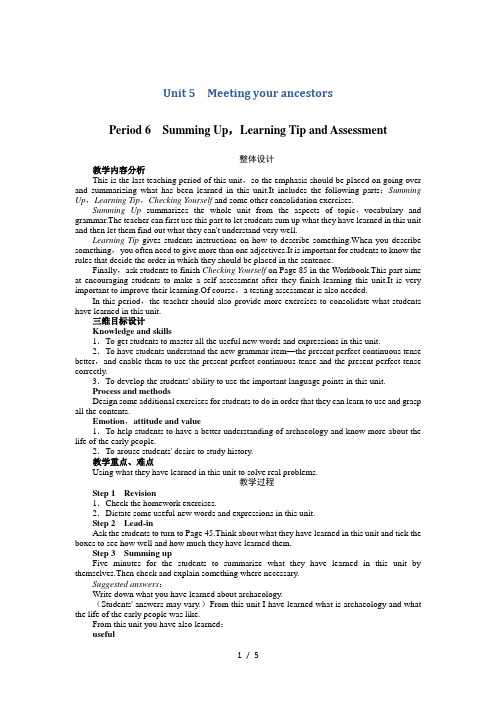
Unit 5Meeting your ancestorsPeriod 6 Summing Up,Learning Tip and Assessment整体设计教学内容分析This is the last teaching period of this unit,so the emphasis should be placed on going over and summarizing what has been learned in this unit.It includes the following parts:Summing Up,Learning Tip,Checking Yourself and some other consolidation exercises.Summing Up summarizes the whole unit from the aspects of topic,vocabulary and grammar.The teacher can first use this part to let students sum up what they have learned in this unit and then let them find out what they can't understand very well.Learning Tip gives students instructions on how to describe something.When you describe something,you often need to give more than one adjectives.It is important for students to know the rules that decide the order in which they should be placed in the sentence.Finally,ask students to finish Checking Yourself on Page 85 in the Workbook.This part aims at encouraging students to make a self-assessment after they finish learning this unit.It is very important to improve their learning.Of course,a testing assessment is also needed.In this period,the teacher should also provide more exercises to consolidate what students have learned in this unit.三维目标设计Knowledge and skills1.To get students to master all the useful new words and expressions in this unit.2.To have students understand the new grammar item—the present perfect continuous tense better,and enable them to use the present perfect continuous tense and the present perfect tense correctly.3.To develop the students' ability to use the important language points in this unit.Process and methodsDesign some additional exercises for students to do in order that they can learn to use and grasp all the contents.Emotion,attitude and value1.To help students to have a better understanding of archaeology and know more about the life of the early people.2.To arouse students' desire to study history.教学重点、难点Using what they have learned in this unit to solve real problems.教学过程Step 1Revision1.Check the homework exercises.2.Dictate some useful new words and expressions in this unit.Step 2Lead-inAsk the students to turn to Page 45.Think about what they have learned in this unit and tick the boxes to see how well and how much they have learned them.Step 3Summing upFive minutes for the students to summarize what they have learned in this unit by themselves.Then check and explain something where necessary.Suggested answers:Write down what you have learned about archaeology.(Students' answers may vary.)From this unit I have learned what is archaeology and what the life of the early people was like.From this unit you have also learned:usefulverbs:interrupt,assume,arrest,sharpen,ripen,spit,delete,scratch,pulse,applaud,h owl,acceleratephrasal verbs:cut up,look ahead,date backusefulnouns:starvation,accuracy,mat,quilt,beast,centimeter,sharpener,botany,analysis,seashell,category,significance,album,academy,receptionist,onion,kindergarten,skate board,yogurt,radioactivity,division,melon,wrinkle,spear,hammer,punctuation useful adjectives and adverbs:regardless,tentative,acute,ample,messy,primitive,botanical,systematic,ra dioactive,dizzy,gay,skillful,somehow,gailyuseful expressions:regardless of,at most,fed up withnew grammar item:the present perfect continuous tenseStep 4PracticeShow the exercises on the screen or give out exercise papers.Ⅰ.Word spelling.1.A river forms the ______(分界线)between the land and mine.2.Few of the early books have been ______(保存).3.Living conditions in the camp were pretty______(原始).4.A lot of ______(分析)of the accident showed what had happened.5.He is very ______(有条理的)in all he does.6.He is making a ______(试探性的)plan.7.It's not polite to i______ others when they are talking.8.After another glass of wine,I began to feel d______.9.You will have to be p______ with my mother—she is rather deaf.10.The knife needs s______.When I cut up meat with it,it doesn't work well.11.It is impossible to i______ the man among so many people.12.The other day the crowd a______his wonderful performance for five minutes.Ⅱ.Fill in the blanks with the expressions given e each expression only once2.____________,my little son was found safe and well.3.This job is open to all,____________ previous experience.4.Her laughter ____________ and we all stared at her.5.Let's ______ the meat ______ and share with each other.6.Ralph was ____________ that Martin was only interested in himself.7.The new method caught on and many peasants ____________.8.Little did I know what troubles were ____________ me when I got home.9.He was endlessly kind and very ____________ children.10.If he wants to get to Chicago by tonight,he ____________ to go by air.Ⅲ.Rewrite the sentences below.1.Although there was some danger,he climbed the building.He climbed the building,______ ______ ______ ______.2.You must know that here we've found evidence of some of the earliest people living in this part of the world.You must ______ ______ that it's here ______ we've found evidence of some of the earliest people ______ ______ in this part of the world.3.Undoubtedly there were fish swimming in it.______ ______ ______ ______ that there were fish swimming in it.4.They had to rub a large quantity of salt onto the skin to make it soft.They had to rub ______ ______ ______ ______ salt onto the skin ______ ______ ______ make it soft.5.They seemed to use the sharpened stone tools to cut up animals.______ ______ ______ they used the sharpened stone tools to cut up animals.6.Did they wear clothes that were made entirely of animal skins?Did they wear clothes ______ entirely ______ animal skins?7.Did early people really care about their appearance the way we do?Did early people really care about their appearance ______ we do?8.She walked to the caves hurriedly fearing that there might be wild animals in the bush.She walked to the caves hurriedly ______ ______ ______ there might be wild animals in the bush.Ⅳ.Multiple choice1.Operator!I've just been ______ while I was on the line to Sydney.Could you reconnect me,please?A.cut up B.cut down C.cut off D.cut through2.There is a lot of evidence to suggest that a short nap in the afternoon ______ you refreshed for the next four or five hours.A.will help B.leave C.will leave D.should remain3.—Where did you get to know Tom?—It was on the farm ______ we worked together 10 years ago.A.that B.which C.where D.when4.I had just stepped out of the bathroom and was busy drying myself with a towel ______ I heard the steps.A.while B.when C.since D.after5.Now,look,Presley,what trouble you've got into!If only you ______ your teacher's advice!A.followed B.would follow C.should have followed D.had followed6.Who do you suggest ______ there to look after the patient?A.be sent B.should send C.that be sent D.being sent7.—I saw Dave in the lift this morning.—Really?He ______ around here for a long time.A.hadn't been seen B.hasn't been seen C.won't be seen D.wasn't seen 8.I was on the highway when this car went past followed by a police car.They ______ at least 150 kilometers an hour.A.should have been running B.would have runC.must have been running D.could have run9.Dundee,as Scotland's fourth largest city,has a long history ______ back to 800AD,as well as a population of about 166 000.A.dating B.dated C.dates D.to date10.I might fail,but ______ I insist on doing it.I don't mind it.A.however B.anyhow C.yet D.meanwhileFirst get the students to do the exercises.Then the answers are given.The teacher can give them explanations where necessary.Suggested answers:Ⅰ.1.division 2.preserved 3.primitive 4.analyses 5.systematic 6.tentative 7.interrupt 8.dizzy 9.patient 10.sharpening 11.identify 12.applaudedⅡ.1.look ahead 2.To my relief 3.regardless of 4.arrested our attention 5.cut;up 6.coming to a conclusion 7.became skilful 8.lying in wait for 9.patient with 10.has no alternative butⅢ.1.regardless of the danger 2.be aware;that,who lived 3.There is no doubt 4.an ample amount of;in order to/so as to 5.It seemed that 6.made;of 7.as 8.for fear thatⅣ.1-5 CCCBD 6-10 ABCABStep 5 Learning tipAsk students to turn to Page 45.Read through the Learning Tip and make sure they understand it.Encourage them to understand and remember them because if they are doing so they will be teaching themselves a useful way of using adjectives correctly.Step 6AssessmentChecking Yourself(on Page 85 in the Workbook)First get the students to think about these questions individually.Then they can discuss in groups sharing their experience.The teacher can join in and give them advice and suggestions wherenecessary.Testing assessmentⅠ.Complete the following sentences.1.你认为他们用它可能还做了什么?What ______ do you think they ______ ______ ______ it ______?2.这根针好像是骨头做的。
Unit 5 Meeting your ancestors课时作业learning about languageⅠ.阅读理解AGetting close to active or erupting volcanoes can be dangerous. But for Michael Rampino, it's all in a day's work. Rampino is a volcanologist, a scientist who studies volcanoes and how they affect our planet. Rampino has been close to red-hot lava flows (熔岩流) in Hawaii and explosive volcanoes in Indonesia. He knows when to get close to an active volcano and when to back away.Rampino wasn't always a volcanologist. He worked for NASA for seven years. He studied rocks until he began to research climate change and the effects that volcanoes have on climate. He became interested in the subject. “Once I started working with volcanoes,” Rampino said, “I was hooked.”Rampino is a professor at New York University. As part of his job, he travels to areas where volcanoes have been active. “Active” means they have erupted within the past few centuries and probably will erupt again. Rampino studies the deposits (沉积物) of ash and other materials from the eruptions. The ash may hold clues to what happened to the Earth in the distant past. It may also help scientists predict what could happen to Earth's climate in the future.Rampino doesn't work alone. He works with a team of scientists who use computers to stimulate (模拟) the effects volcanoes have on Earth's atmosphere.Being a volcanologist may be hard work, but it's also fun. “It's cool traveling the world studying volcanoes,” Rampino says. When he talks to students about his work, he tells them that his goal is “to understand the events that have shaped Earth's history.”篇章导读:本文是一篇记叙文。
文章讲述了一位火山学家的相关事迹。
1.To Rampino, being close to active volcanoes is ________ .A.adventurous but meaningfulB.scary but necessaryC.impossible and unnecessaryD.dangerous but urgent答案:A推理推断题。
根据第一段可知这样的工作很具有冒险性;再根据文章第三段最后一句可知这样的工作也很有意义。
2.The underlined word “hooked” in Paragraph 2 probably means “________ ”.A.trapped B.touchedC.frightened D.attracted答案:D词义猜测题。
根据上一句中的“became interested in the subject”可知,Rampino一旦开始火山研究工作时,就会入迷、被吸引,故这里是被“吸引”的意思。
故选D项。
3.Rampino's study on volcanoes might help ________ .A.warn people to protect the environmentB.support the study of Earth's future climateC.tell the future eruption time of the volcanoesD.reduce the possibility of the volcanoes' eruptions答案:B细节理解题。
根据第三段最后一句“It may also help scientists predict what could happen to Earth's climate in the future.”以及第四段最后一句可知,他的工作有助于研究地球未来的气候。
故选B 项。
4.In which part of a newspaper could we find this text?A.Climate. B.History.C.People. D.Business.答案:C推理判断题。
本文是介绍了一位研究火山的专家,应该属于报纸中的人物版块。
故选C项。
BThe volcano is one of the most surprising frightening forces of nature. Maybe you hav e seen pictures of these “fireworks” of nature. Sometimes when a volcano erupts,_a very large wall of melted rock moves down the side of a mountain. It looks likes a “river of fire”. Sometimes volcanoes explode, throwing the melted rock and ashes high into the air. But where does this melted rock come from? The earth is made up of many layers. The top layer (层) that we see is called the crust. Under the crust are many layers of hard rock. But far, far beneath the crust whose rock is so hot that it is soft. In some places it even melts. The melted rock is called magma. Sometimes the magma breaks out to the surface through in the crack. These cracks are volcanoes.Most people think of mountains when they think of volcanoes. But not every mountain is a volcano. A volcano is simply the opening in the earth from which the magma escapes. The hot magma, or lava as it is called, builds up on the surface of the earth. Over thousands of years, this pile of cooled lava can grow to be very, very big. For example, the highest mountain in Africa, Kilimanjaro, is a volcano. It towers more than 16,000 feet above the ground around it.篇章导读:本文是一篇说明文。
文章主要介绍了自然界的神奇力量——火山。
5.The underlined word “erupts” in Paragraph 1 means “________ ”.A.moves downB.breaks awayC.builds upD.suddenly throws out lava答案:D词义猜测题。
根据第一段的描述可知此处指火山喷发,D项意为“突然释放出岩浆”,与“喷发”意义最为接近。
故D项正确。
6.Which words in the passage have the same meaning as “melted rock”?A.“V olcano” and “explode”.B.“Crust” and “hard rock”.C.“Magma” and “lava”.D.“V olcano” and “magma”.答案:C细节理解题。
由第一段倒数第三句和第二段第四句可知,“magma”和“lava”可代替“melted rock”,表示“岩浆;熔岩”。
7.Which is the correct order of the layers of the earth (beginning with the top layer)?A.crust—hard rock—magma—soft rockB.crust—hard rock—soft rock—magmaC.magma—soft rock—hard rock—crustD.volcano—cracks—magma—crust答案:B细节理解题。